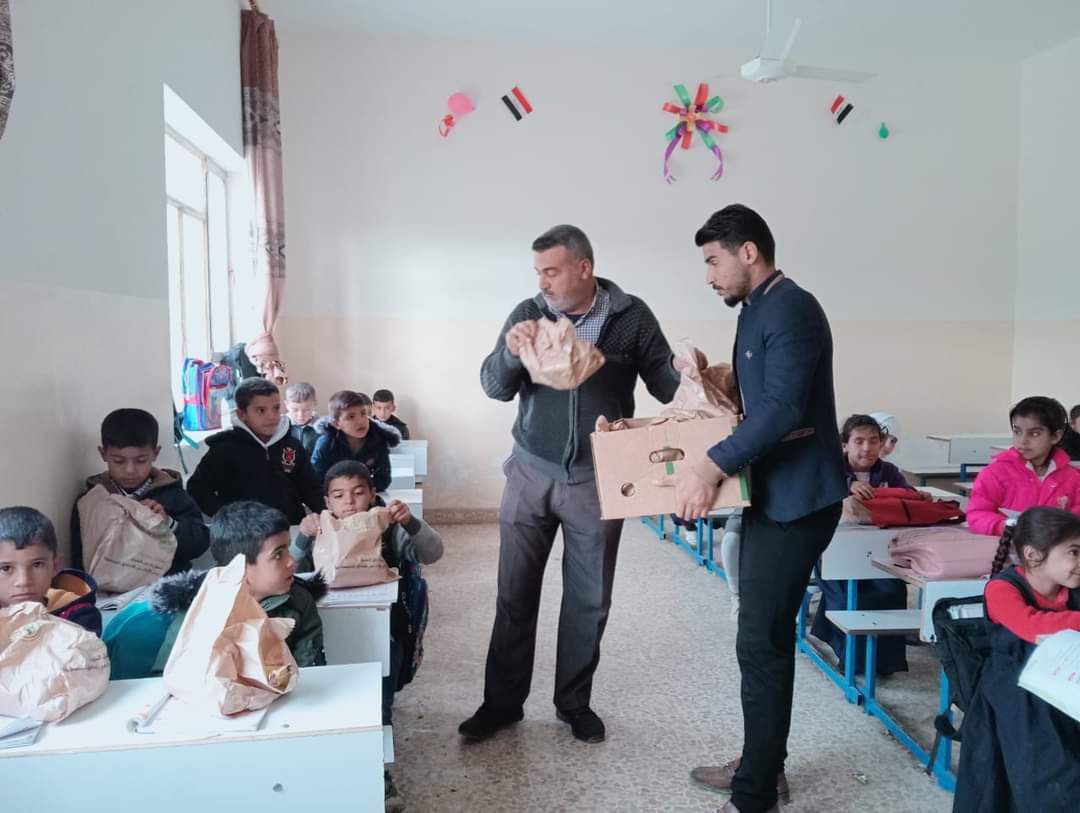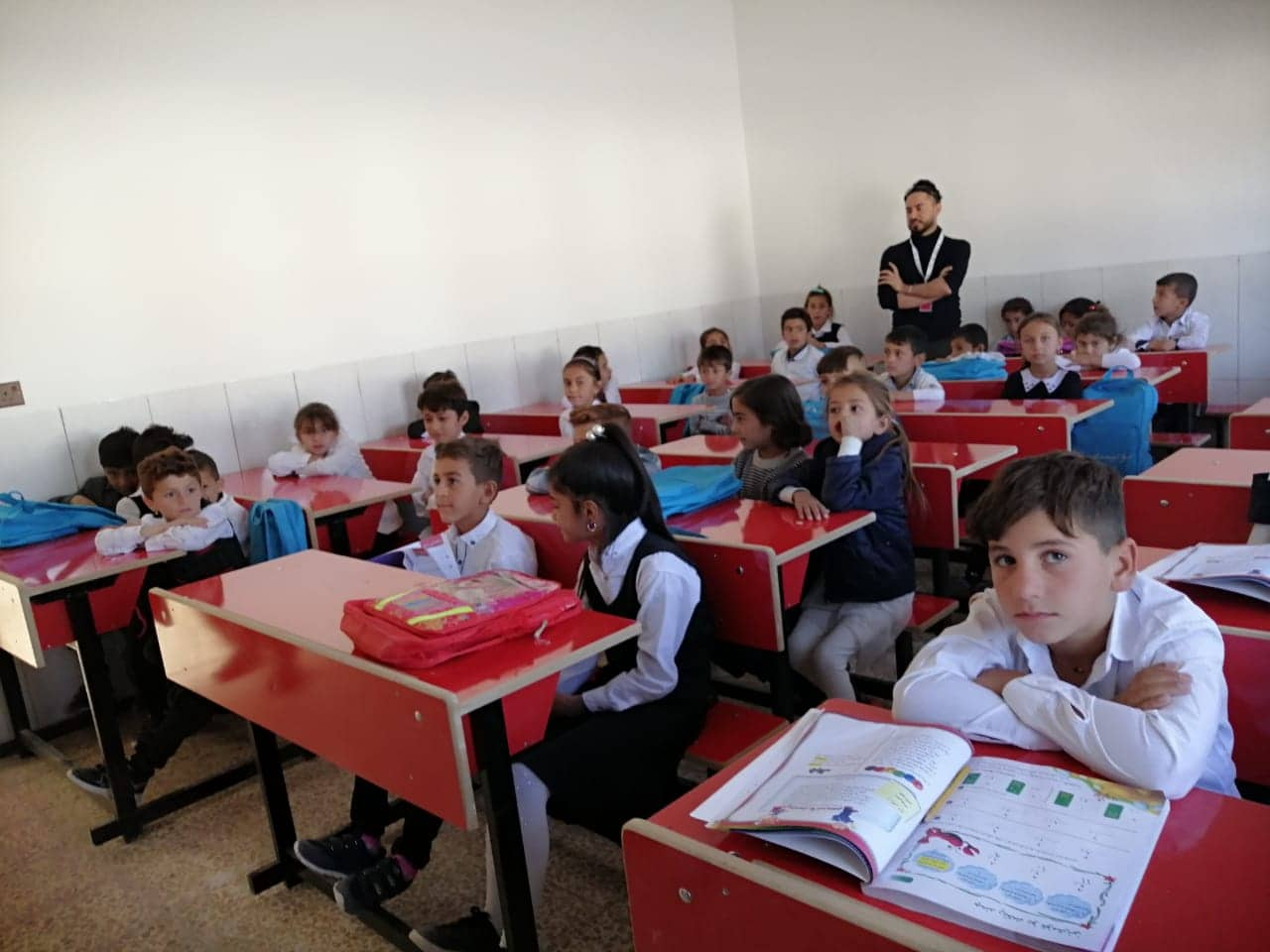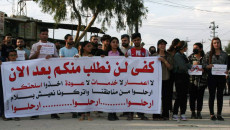Every year, hundreds of students in Shingal (Sinjar) and the Nineveh Plain leave schools teaching in the Kurdish language and go to Arab schools for several reasons, most notably the distribution of state food items and financial scholarships to students in the Arabic study department.
Kurdish studies began in Nineveh Governorate in 2003 after the fall of the Baath regime headed by Saddam Hussein. It gradually developed and the number of families enrolling their children in Kurdish schools increased, but the past few years have witnessed a continuous decline.
Rasho Khudida, residing in the Mam Rashan camp for displaced people in Shekhan district of Nineveh Governorate, transferred his son to Arabic studies since he was in the second grade.
“Many have taken their children out of Kurdish studies. I feel that Kurdish studies have no future, because opportunities of Recruitment and creating job opportunities for them are less compared to Arabic studies,” Khudida believes.
I feel that Kurdish studies have no future
Rasho said, "In addition, the Education Directorate of the Arabic Studies Department allocated financial grants to students and students whose families are covered by social assistance salaries."
According to the Iraqi government’s decision, the scholarship is distributed at a rate of 30,000 Iraqi dinars IQD (usd20) for primary school students and 50,000 IQD for middle and high school students. The decision includes only the Arabic Studies Department of the Iraqi Ministry of Education.
On the other hand, Kurdish schools affiliated with the Kurdistan Regional Government KRG constantly suffer from several problems represented by the scarcity of textbooks, buildings and teaching staff, while these problems are less in Arab schools.
“Another reason that prompted me to remove my son from Kurdish studies is that in recent years, Arab schools have paid more attention to the educational process compared to Kurdish studies,” Khudida added.
The district of Shingal, 120 km west of Mosul, the center of Ninewa province, is home to the non-Muslim Ezidi minority heavily targeted by the Islamic State in Iraq and Levant ISIL group in August 2014 and one of the disputed territories between Baghdad and Erbil.
There are more than 600,000 Internally Displaced People IDPs in the Iraqi Kurdistan Region IKR, some of whom are staying in 26 camps, mostly non-Muslim Ezidis (Yazidis) and Muslim-Sunni Arabs from Nineveh, according to the KRG figures.
Schools in Shingal were destroyed during the rule of ISIS (2014-2015) and most of them were demolished. All the teachers and students were displaced, but with the recapture of the area and the return of some families, the education process resumed in the district. However, many are still studying in IDP camps.

Farhan Saleh, a teacher at Balistan Arab School in the Dahola Complex of Shingal Education, told (KirkukNow), “The Iraqi Ministry of Education takes great care of its schools, in terms of providing books and other educational supplies and restoring the buildings.”
Recently, the school feeding program was launched in Nineveh Governorate, where a food basket containing biscuits, bananas, milk and water is distributed to students, while Kurdish schools are deprived of them, and this is seen as another reason behind the migration from Kurdish schools.
These factors generally led to a decline in the proportion of students in the Kurdish education department compared to Arabic, even in areas with a Kurdish majority.
In general, public schools of Shingal district suffer from a lack of buildings, budgets and teaching staff, and part of this problem started when the Iraqi government stopped employment for all sectors including education leaving schools in need of new teachers.
Education like other public sectors is divided between Baghdad and Erbil as schools sponsored by Baghdad study Arabic curriculum while those funded by the KRG are in Kurdish.
In Shingal district, 50,000 male and female students study in the Arabic studies department, and this number includes students who are still displaced, while the number of Kurdish students is only 30,000, according to Shingal Education statistics.
The school where Farhan attends has 70 students in the first grade of primary school, while the number of primary school students in a nearby Kurdish school is only five students.
“If things continue like this, Kurdish studies will disappear,” Farhan said.
Maysar Hajji, Director of Shingal Education - Kurdish Studies Department - said, “Kurdish studies are in constant decline. Every year, 300 students leave Kurdish schools and go to Arabic studies, and some enroll their children directly in Arab schools.”
"The Iraqi government's distribution of financial scholarships and food items to students in the Arabic study department is one of the main reasons behind the migration from Kurdish schools during this year,” he added.
“We do not have the financial capabilities that would allow us to distribute stipends and food."
In general, the educational process in the Iraqi Kurdistan Region is not running smoothly, as attendance has been suspended in most schools in Sulaymaniyah Governorate after teachers went on strike since the beginning of the school year due to the non-payment of their salaries, as the salaries for the last quarter of 2023 were skipped, and up today, and teachers have not been paid for January. A number of schools resumed work only 10 days ago.
Hassan Saleh, Director of Shingal Education - Department of Arabic Studies - told (KirkukNow), “We are saddened by depriving the students of the Kurdish Studies Department of financial scholarships, but this matter is not within our powers.”
(KirkukNow) could not obtain official statistics on the number of students in Nineveh Governorate who are covered by the financial grant and the school feeding system, but citizens and education officials stress that it is one of the most prominent reasons for migration from Kurdish studies.






